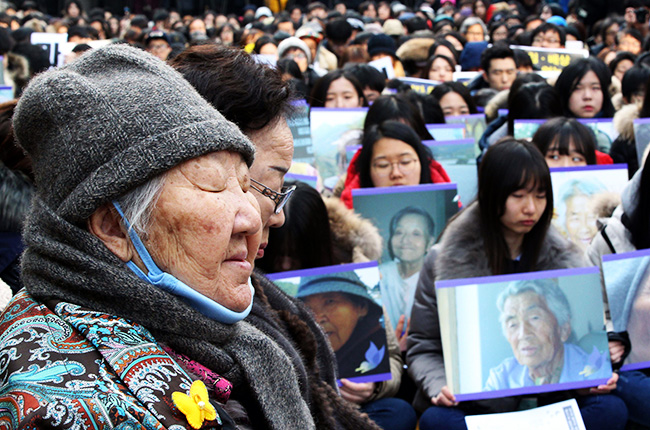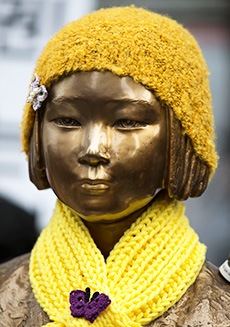- California Assembly OKs highest minimum wage in nation
- S. Korea unveils first graphic cigarette warnings
- US joins with South Korea, Japan in bid to deter North Korea
- LPGA golfer Chun In-gee finally back in action
- S. Korea won’t be top seed in final World Cup qualification round
- US men’s soccer misses 2nd straight Olympics
- US back on track in qualifying with 4-0 win over Guatemala
- High-intensity workout injuries spawn cottage industry
- CDC expands range of Zika mosquitoes into parts of Northeast
- Who knew? ‘The Walking Dead’ is helping families connect
Weekly ‘comfort women’ rally continues

Gil Won-ok, front, and Lee Yong-soo, two victims of sexual slavery by Japan during World War II, listen to a speaker during the weekly rally in front of the Japanese Embassy in Seoul, Wednesday. (Korea Times photo by Choi Won-suk)
By Kim Se-jeong
Chilly weather could not discourage angry former sex slaves and activists from criticizing the agreement between Korea and Japan over the sexual slavery issue.

A statue of a girl symbolizing a Korean sexual slavery victim in front of the Japanese Embassy in Seoul, Wednesday.
(Korea Times photo by Choi Won-suk)
At least 600 people took part in the “Wednesday rally,” a weekly event in front of the Japanese Embassy in Seoul since 1992, showing their support for continuing the campaign.
It was the first rally after the agreement was made Monday.
Yoon Mee-hyang, head of the Korean Council for Women Drafted for Military Sexual Slavery by Japan, which organizes the weekly rally, said she was disappointed, adding the agreement made the 24 years of her organization’s work amount to nothing.
“But I am undeterred by this,” she said. “We have come a long way in the last 24 years. The future fight will be harder, but we will continue.”
She vowed to increase the number of statues of a young girl, the symbol of the issue, around the world. The first one was set up in front of the embassy, which Japan wants relocated, but dozens of others have been erected since.
Yoon said she wants to erect more statues in Korea to spread the weekly rally to other parts of the country. “I see enormous support today. I believe we can do this.”
On Monday, Foreign Minister Yun Byung-se and his counterpart Fumio Kishida announced that the Japanese government would pay 1 billion yen ($8.3 million) to establish a fund for the 46 surviving former sex slaves. Also, they said that the agreement was “final and irreversible.”
But, Japan failed to spell out its legal responsibility for the atrocity, raising skepticism about its sincerity, drawing criticism from activists and the public in Korea.
One of the victims, Lee Yong-soo, 88, took the stage and repeated her condemnation of Japanese Prime Minister Shinzo Abe and the foreign ministry.
“Abe is out of his mind,” Lee said in a loud and strong voice. “We need to act to get Abe to act.”
Her criticism of the Korean government was more acute.
“The Korean government had no word about the negotiations with us before they went into the talks. When I asked the diplomat (First Vice Foreign Minister Lim Sung-nam) why he had not come earlier, he answered it was because it was on the weekend. What an excuse! He said his mother is my age. Would he have done the same (if his mother were one of the victims)?”
Lee vowed to continue her campaign. “I will continue to fight until the day I die. I feel your support today, which empowers me. I still have the energy to fight.”
The rally also commemorated nine former sex slaves who passed away this year. Each of their names was mentioned at the beginning of the rally, and their biographies were shared with all the participants. Participants held portraits of the deceased to their chests and put flowers on a makeshift memorial installed at the rally site at the end of the event.
Many among the participants were students, a lot of whom came from Yeonsu Girls’ and Ewha Girls’ high schools.
“Being here is the right thing to do,” Park Ji-won, 17, from Yeonsu, said. She said she had signed up for the rally weeks before, but “I would have come here anyway, given that the agreement was so unacceptable. I want to show my support for the victims.”
Sunny Kim, 45, Seoul, brought her two children _ nine and 13 years old _ to the rally. “I wanted my children to feel what is going on and to learn the truth about history.” Her daughter Moon Hyun-jin, 13, said she was impressed by the crowd and hoped to see Japan apologize formally.
Lawmakers from opposition parties also attended, including Rep. Kim Je-nam from the Justice Party, and Rep. Yoo Seung-hee and Shin Kyoung-min from the Minjoo Party. Earlier in the day, Minjoo Party leader Moon Jae-in demanded the agreement be nullified, saying the government failed to consult with the legislative body beforehand.
Gu Gyo-hyeon, leader of Korea’s Labor Party, criticized President Park Geun-hye. “Park is a strong supporter of labor reform which will make it easy to fire underperformers at work. She is clearly an underperformer and should be the first to be fired. Her policies are a big failure.”
The crowd was surrounded by photographers and journalists, some of whom were from Japan. One Japanese journalist made a live broadcast of the rally. Yoon pleaded with them, saying, “I know there are many from the Japanese media. Please use my photo only for the reports. Do not misuse it, please!”
















Pingback: Takanori Learn Japanese Symbols | news - tolkserviceitaly.com
Pingback: Takanori Learn Japanese Symbols | test - tess2000